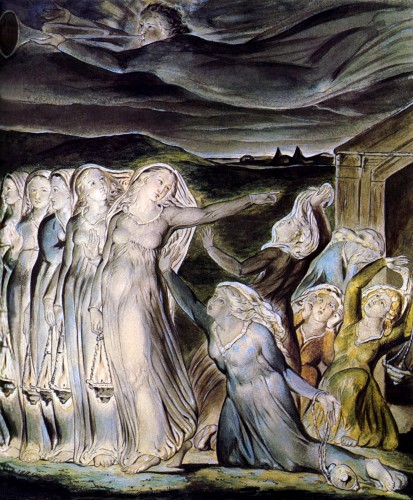
We’ll be doing a new, five-or-six-week series on some stories from the Gospels as portraits of grace (or basically really, really good short stories that happen to be true). This week’s is on the woman at the well, found in John 4:1-42.
 You know the story: Jesus walks up to a new place, requests a meeting with the village elders, tells them he’s an up-and-coming Jewish teacher who doesn’t have beef with the alienated Samaritans, and organizes a speaking engagement in the tradition of the tent revival. That’s what I would’ve done.
You know the story: Jesus walks up to a new place, requests a meeting with the village elders, tells them he’s an up-and-coming Jewish teacher who doesn’t have beef with the alienated Samaritans, and organizes a speaking engagement in the tradition of the tent revival. That’s what I would’ve done.
Francis Spufford, in his incredible chapter on Jesus’ life, he says that Jesus acts “as if the person he’s talking to is the only person alive.” It is no coincidence that the woman Jesus talks with here is probably the most disreputable outcast in the village, but he is entirely absorbed by her. Their conversation provides some vague but compelling clues as to what Jesus’ ministry will look like, and it’s chock-full of pastoral wisdom.
For starters, there’s a preemptive grace in him talking to her in the first place. She’s presumably a pariah for her five husbands and ‘live-in’ relationship at a time when sexual/marital judgment was incredibly harsh. And we can almost hear her first response being, ‘If he only knew what everyone else thinks of me…” Defensiveness is natural; like many of us, she’s putting up a barrier of argumentation and disagreement in response to her feeling of vulnerability.
But Jesus begins to set her at ease by leading with his own weakness: he needs water, and she can provide him with it. And him showing his own need to her probably isn’t some elaborate pastoral strategy, but just natural honesty, a freedom from the need to have it all together. But the woman can’t help expressing her astonishment that he’s talking to someone unclean, outside of God’s chosen people, and we see her first insecurity, about being a Samaritan, rise to the surface. A fight’s brewing.
Jesus, ever-vague, offers her living water: something probably foreign to her, and pointing to his spiritual provision for all our needs. She can’t help mistaking him to mean “running water”, and is immediately offended that he thinks he’s got something better than the semi-stagnant stuff at the bottom of a well. So she becomes defensive again, still picking a fight, and lets him know that her people are descended from Jacob himself, and he’s pretty arrogant to think he’s better.
And rather than explaining what he means, Jesus (perhaps mulishly) continues on, offering a stream of living water “gushing up to eternal life.” It’s an image of life and sustenance beyond this world, echoed in Revelation (21:6); infinite nourishment for those with infinite dependence upon God.
 To the woman, it sounds like a needed break from the wrist-wrenching task of drawing up water every day. And she accepts it – in knowing her need and recognizing Christ’s ability to provide, she’s at the point of faith already – even though she’s misunderstood almost every word he’s been saying. But, as elsewhere in John (ch 6, for example), Jesus examines our physical needs, which are very clear, as a symbol for our spiritual needs, which we’re much less willing to think about. Just as healing can’t be done without a diagnosis (see Mk 2:17), so too grace can only operate when we are fully known. As long as she’s keeping a secret, there’s the fear that Jesus, just like everyone else, which reject her if he finds out who she really is. And so he demonstrates his knowledge of her so that his love can become something concrete, beyond judgment (note: do not try at home).
To the woman, it sounds like a needed break from the wrist-wrenching task of drawing up water every day. And she accepts it – in knowing her need and recognizing Christ’s ability to provide, she’s at the point of faith already – even though she’s misunderstood almost every word he’s been saying. But, as elsewhere in John (ch 6, for example), Jesus examines our physical needs, which are very clear, as a symbol for our spiritual needs, which we’re much less willing to think about. Just as healing can’t be done without a diagnosis (see Mk 2:17), so too grace can only operate when we are fully known. As long as she’s keeping a secret, there’s the fear that Jesus, just like everyone else, which reject her if he finds out who she really is. And so he demonstrates his knowledge of her so that his love can become something concrete, beyond judgment (note: do not try at home).
Now she’s really threatened, and, like lots of us when threatened with moral judgment, tries to start a theological argument. She brings up a hot-button issue (read: Obamacare, climate change, etc) to regain some edge, to prove herself to this man who knows “everything [she’s] ever done.”
And finally the pivotal moment: Jesus tells her he’s the Messiah, and she believes. But it’s not a rollicking sermon, or painstaking comparison of Old Testament messianic prophecies, or a miracle, or anything else that convinces her. The woman is one of the few people in John’s gospel who believes him, who understands. And bizarrely, Nicodemus was a pro-Jesus religious leader who knew the scriptures backward and forward, and he just seems confused.
Perhaps the woman believes because she’s had a hard life: she’s suffered a score of failed relationships and been crushed by the Law. The woman at the well, Zacchaeus, the man hanging beside Jesus on the cross – they all believe him without miraculous displays of power or long theological defenses. In these accounts, the true sign of the Messiah is one who both knows our hearts and still loves us. The woman exaggerates when she says Jesus “told me everything I have ever done”, but she’s right in that this one thing – the locus of her self-recrimination – is all that matters to her. The sign of the Messiah is fully knowing and fully loving, and it’s seen most clearly by those on their knees.

COMMENTS
7 responses to “Bible Wednesdays: Jesus Met the Woman at the Well”
Leave a Reply













Thanks, Will.
“Jesus met the woman at the well/ And he told her everything she’d ever done” – Dave Van Ronk:
http://www.youtube.com/watch?v=1UeFu7QdZPI
Thank you for this insightful post, Will.
So true.
Thanks Will. Fully known, fully loved. Wonderful!
Great piece, Will. Your writing style reminds me a bit of Capon. I can’t wait for more of these! JZ
Has anyone heard the Sam Cooke song “Jesus gave me water?” It is a great song telling the story if the woman at the well.
Check out Sam Cooke and The SoulStirrers version of “Jesus Gave me Water”. Outstanding song and happens to be about this very passage.